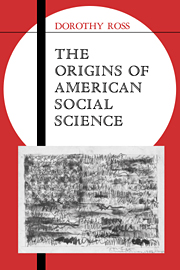Book contents
- Frontmatter
- Contents
- Acknowledgments
- Abbreviations used in the footnotes
- Introduction
- Part I European social science in antebellum America
- Part II The crisis of American exceptionalism, 1865–1896
- 3 Establishment of the social science disciplines
- 4 The threat of socialism in economics and sociology
- Part III Progressive social science, 1896–1914
- Part IV American social science as the study of natural process, 1908–1929
- Epilogue
- Bibliographical note
- Indexes
- Ideas in Context
3 - Establishment of the social science disciplines
Published online by Cambridge University Press: 23 September 2009
- Frontmatter
- Contents
- Acknowledgments
- Abbreviations used in the footnotes
- Introduction
- Part I European social science in antebellum America
- Part II The crisis of American exceptionalism, 1865–1896
- 3 Establishment of the social science disciplines
- 4 The threat of socialism in economics and sociology
- Part III Progressive social science, 1896–1914
- Part IV American social science as the study of natural process, 1908–1929
- Epilogue
- Bibliographical note
- Indexes
- Ideas in Context
Summary
Before the Civil War the social sciences, like most of the loosely constructed fields of humane learning in America, had led a fragmented existence. Economics and combinations of history and politics had established presences in the antebellum colleges, though subordinate to clerical influence and the moral philosophy curriculum, while men of affairs took up these subjects as part of the larger policy debates of the era. After the war, growing wealth, university expansion, and increasing specialization of labor and knowledge opened the way to the establishment of independent social science disciplines. What galvanized social science practitioners into self-consciousness and gave the new disciplines their American shape was a crisis in the national ideology of American exceptionalism, which gathered force through the Gilded Age. On one level the crisis was connected to the problem of intellectual authority, as science increasingly discredited the apologetic stance and naive resort to divine providence of the established voices in American culture. On another level, the crisis grew out of the social and political challenges of the Gilded Age, as Civil War and Reconstruction and then rapid industrialization appeared to test whether America could sustain the principles that defined her place in history.
The Gilded Age crisis
Among the Whiggish class of clerics and men of affairs whose centrist versions of social science had predominated in education and politics, there were some who responded quickly and forcefully to the wide-ranging cultural and social upheavals of the Gilded Age.
- Type
- Chapter
- Information
- The Origins of American Social Science , pp. 53 - 97Publisher: Cambridge University PressPrint publication year: 1990

